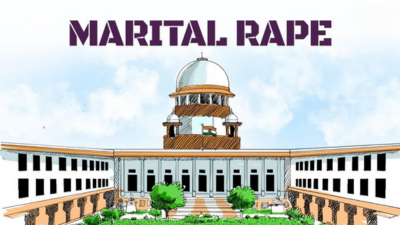On Thursday, the Union government submitted an affidavit to the Supreme Court opposing petitions calling for the criminalization of marital rape in India (Hrishikesh Sahoo vs. Union of India and others).
In the counter-affidavit, filed by advocate AK Sharma on behalf of the Union Home Ministry, the government defended the existing Indian rape law, which makes an exception for sexual relations between married couples.
The Centre emphasized that the issue is more social than legal and has significant implications for society. It argued that, even if marital rape were to be criminalized, such a decision should not fall to the Supreme Court.
“The issue cannot be resolved without proper consultation with all stakeholders and considering the views of all states… While the act colloquially referred to as ‘marital rape’ ought to be illegal and criminalized, the Central Government contends that a woman’s consent is not nullified by marriage, and violations should carry penal consequences. However, the ramifications of such violations within marriage differ from those outside of it,” the affidavit stated.
The Centre highlighted that a breach of consent should be penalized differently depending on whether it occurs within or outside marriage. It pointed out that within a marriage, there exists a reasonable expectation of sexual access from one’s spouse, although this does not give a husband the right to coerce his wife into sex against her will.
However, the Centre argued that it may be excessive and disproportionate to apply anti-rape laws in such cases. It noted that Parliament has already established various remedies to protect a married woman’s consent within the marriage, including laws against cruelty toward married women (Section 498A of the Indian Penal Code) and protections under the Protection of Women from Domestic Violence Act, 2005.
“The sexual aspect is only one of many facets of the relationship between husband and wife, upon which the foundation of their marriage rests… Given the nature of the marital institution in our socio-legal context, if the legislature believes that preserving the institution of marriage necessitates maintaining the impugned exception, it would be inappropriate for this Hon’ble Court to strike it down,” the affidavit added.
This counter-affidavit was filed in response to several petitions advocating for the criminalization of marital rape. The Centre criticized the petitioners for treating marriage as a purely private institution, describing this perspective as unidimensional.
It argued that the case of a married woman and her husband cannot be treated the same as other cases, asserting that it is the legislature’s role to determine the penal consequences of sexual abuse in various contexts.
The Central government maintained that the existing law does not dismiss consent to sexual advances between spouses but treats such situations differently within the context of marriage. This approach aligns with Article 14 (right to equality) of the Constitution, which does not equate two fundamentally different situations—sexual relations within marriage versus those outside it.
The Union government reiterated its commitment to women’s liberty and dignity, stating that marital rape does not need to be criminalized, as alternative “suitably tailored penal remedies” already exist.
The matter is currently being heard by a Bench comprising Chief Justice of India DY Chandrachud, Justice JB Pardiwala, and Justice Manoj Misra.
Marital rape is currently excluded from the definition of “rape” under Exception 2 of Section 375 of the Indian Penal Code (IPC), and a similar provision is included in the recently enacted Bharatiya Nyaya Sanhita (BNS), which replaced the IPC on July 1 this year.
In 2022, the Delhi High Court issued a split verdict on whether marital rape should be criminalized, leading to the case reaching the Supreme Court in September of that year.

















